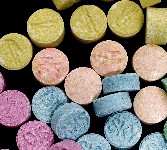 Ecstasy, or 3,4 methylene-dioxymethamphetamine (MDMA), is one of a large family of hallucinogenic drugs with similar properties to both LSD and amphetamines. It often is purchased in the form of small tablets that may have a picture printed on them such as a dove, a hammer and sickle, or a diamond, and the drug is often referred to by its appearance (such as 'Doves'). Ecstacy produces an initial rush, along with an uneasy stomach and dilated pupils; this is followed by a warm euphoric glow that may last 4-6 hours. With large doses (or inexperienced users), symptoms can also include anxiety, panic and confusion. Frequent use results in sleep problems and lethargy when the drug wears off. Users feel more energetic and often lose their appetite, which often results in malnutrition. The stimulant effect of the drug raises the blood pressure and heart rate; users with problems in these areas are at risk for complications. Because ecstasy is also a stimulant, it increases brain activity and triggers the release of dopamine and serotonin (the neurotransmitter responsible for regulating mood, sleep patterns, memory, perception of pain and appetite). A user may suffer from an inability to sweat, cramps in the extremities, giddiness, headache, fatigue, vomiting, fainting, or suddenly feeling unusually tired and irritable. Some users also experience difficulty in urinating; ecstacy causes the hypothalamus in the brain to secrete an anti-diuretic hormone, which stops the kidneys from producing urine. People have died from taking just one or two tablets of ecstasy, usually at clubs or raves where dehydration and over-heating have been a major factors. (MDMA alters the way the body regulates its internal temperature). A small number of people are overly sensitive to MDMA, leading to their deaths after ingesting a relatively low dose. Regular use of MDMA by an average user can cause long-term brain changes, which may be linked to chronic depression and premature senility. Some studies have indicated that the drug is toxic to the brain's neurons, causing permanent damage. Other research has shown that former ecstasy users may suffer memory impairment, even a year or more after stopping use of the drug. Although ecstacy does not produce a physical dependency, users can easily become psychologically addicted to it. Also, as with most drugs, repeated use of the drug increases the body's tolerance for it; bigger and bigger doses are required to achieve the same 'high'. Another problem with this drug is that users may not be getting ecstacy at all when they purchase it. One study of the drug, a drug which is freely available on the street, discovered that only one tablet in four actually contained MDMA. Pills can contain the chemicals MDEA and MDA, caffeine, fish tank cleaners, cat tranquilizers, ketamine, or other prescribed medicines like Ritalin or amphetamines, ... all to enhance the pill's effects. Recently in Canada, crystal methamphetamine is being found in ecstacy tablets ... this is scary! Ecstasy is hard on the liver and kidneys, and long-term users may develop liver and kidney problems later in life. People with pre-existing medical problems such as epilepsy, high blood pressure or depression are thought to be more likely to suffer side effects from ecstasy use. |